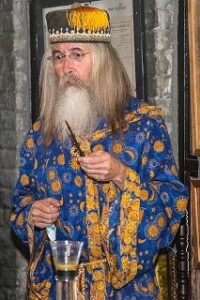This is Faith in Play #40: Harry Potter Series Follow-up, for March 2021.
This was originally published as an entry in the Blogless Lepolt web log at Gaming Outpost under the title Opinion Vindicated, and recently recovered thanks to Regis Pannier of the French edition of Places to Go, People to Be.

Many of you will by now have seen the news that J. K. Rowling has stated her heroic and much-revered character Dumbledore is “gay.” Already I have been asked about this, and I will be giving my answer here in a moment. What interests me more is her revelation, more quietly reported, that the entire Harry Potter series is, and has always been, a Christian story. Rowling kept this “secret” close to her breast while dealing each book, as she feared giving it away too soon would lead readers to guess the end before they reached it. This pleases me. I’m not the only person to have noticed the Christian influences in the Harry Potter series, and I’m certainly not the most vocal of those defending it, but I have taken a stand in defense of the stories as part of my unofficial position as defender of Christian fantasy in the modern world. Having her say what I have been saying is rewarding.
On the other report, over on MySpace, a mysterious friend through a friend who often asks me odd questions, Dr. Jack Centipede, asked me my opinion of the report. My comment there was truncated—apparently I failed to keep to some unstated word limit imposed by MySpace—so I am going to copy what was saved and attempt to complete it here.
I don’t want to say that an author is wrong about her own character, so what I’ll say instead is, I don’t see it.
There is something of a pernicious error which grew in the twentieth century, which holds that two men who care about each other and who bond with each other are therefore homosexuals. C. S. Lewis complained about this, saying (I think in The Four Loves) that when you have these close friendships, that “philos” “brotherly love,” someone will say that of course they are “really” homosexual—and that what you feel is pity for the one who says this, because it suggests that he has never known real friendship. It is quite possible for men to care about each other without being homosexual, but in our age every effort is made to characterize such relationships as homosexual, because those in homosexual relationships want to be able to claim that their relationships are “normal.”
I see nothing in Dumbledore’s relationship with Grindelwald that indicates it to be more than a very close friendship, the kind of friendship I have had rarely in my life. Dumbledore is not gay, but caring and sensitive and eager to know people and to forge relationships with them. It is not the same thing.
Let me make two more points on this, briefly.
First, if Dumbledore is gay, then any man who has ever felt a close connection, a bond of sincere friendship and mutual interest, with any other man, is also gay. I think—indeed, I would hope—that that would be all men everywhere. By this definition, then, every man is gay; and if that is so, then the category is meaningless, and no man is.
Second, it is significant in my mind that the same is not said about women. We assume that women forge these dear and close friendships with other women, and that this says nothing about their sexuality. It is only when men forge such relationships that this becomes “homosexual” or “gay.”
This puts men in a lose-lose situation. On the one hand, we are accused of being cold, uncaring, unemotional, self-centered and self-interested, failing to bond with others, failing to share our true feelings. On the other hand, should we venture to warm, care, emote, reach out to and bond with others, and share our true feelings, we are suddenly branded as “gay.” You can’t have it both ways. Either it is quite normal for people—men and women—to have caring relationships with each other, or it is always abnormal for anyone—man or woman—to care about a member of the same sex.
Thus I think Rowling has fallen into the trap of assuming that her character Dumbledore must have been gay because he cared deeply for and about another man. I care deeply for and about my father, my uncles, my cousins, my brothers, and my sons; that does not make me gay—nor does it make me gay if I also care deeply about friends who happen to be guys. What’s a guy to do, anyway? After all, if I, as a married man, care deeply about other men, I am labeled “gay;” but if I care deeply about other women, I am labeled “lecherous.” The only kind of man we will accept as manly is the one who doesn’t care for anyone but himself, and that’s not the kind of man we need in this life.
From there I commented on the Christian connections of the book, including the above news link, but since I’ve already done that here I won’t repeat it.
There are a dozen things I am supposed to be doing right now, I suppose, but rather than attempt to list them here, I’m going to attempt to do them, and maybe tell you about them tomorrow. The gout persists, flaring up overnight, but calming a bit as I work; I wonder to what degree the constriction of my feet within my shoes is reducing the pain.
Previous article: Of Aliens and Elves.
Next article: Faith.
